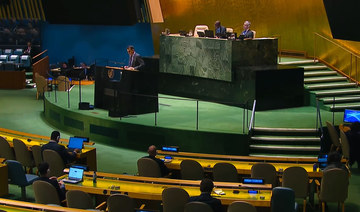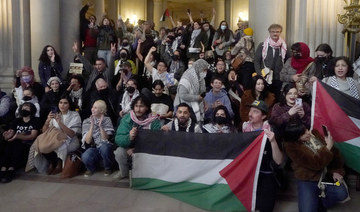GAZA STRIP: US top diplomat Antony Blinken on Wednesday met the head of the Palestinian Authority and traveled to Bahrain on his Middle East tour aimed at stopping the Israel-Hamas war from escalating.
The Israeli military said it killed dozens of “terrorists” and hit another 150 targets in Hamas-run Gaza, where the health ministry said 147 people had been killed over the previous 24 hours.
The bloodiest ever Gaza war has raged since the unprecedented Hamas attacks against Israel on October 7 and killed more than 23,000 people in the besieged Palestinian territory, according to its health ministry.
Palestinian president Mahmud Abbas spoke with Blinken of the need “to stop the Israeli aggression against Palestinian people” in Gaza and the occupied West Bank, which has also been torn by deadly unrest, said the official Palestinian news agency Wafa.
Blinken told Abbas that Washington supports “tangible steps” toward the creation of a Palestinian state — a long-term goal which Israeli Prime Minister Benjamin Netanyahu’s hard-right government has opposed.
The secretary of state reiterated the US position that a Palestinian state must stand alongside Israel, “with both living in peace and security,” said State Department spokesman Matthew Miller.
As Blinken arrived under tight security at Abbas’s headquarters in Ramallah, protesters held up signs reading “Stop the genocide,” “Free Palestine” and “Blinken out.” Some scuffled with Palestinian security forces in riot gear.
In Bahrain, Blinken said Abbas was “committed” to reforming the Palestinian Authority to provide “effective” governance for his people.
Blinken was in the Gulf state for talks with King Hamad on preventing a regional escalation of the war, according to the State Department.
Abbas and Egyptian President Abdel Fattah El-Sisi arrived in the Jordanian city of Aqaba to discuss with King Abdullah II a “push for an immediate cease-fire” in Gaza, Jordan’s royal palace said.
Washington sees a future in Gaza for the PA, whose ruling Fatah faction is a rival of Hamas. But Netanyahu has long sought to weaken the semi-autonomous body.
Since the Gaza war started, fears have grown of a widening conflict between Israel and Iran-backed armed groups, especially Lebanon’s Hezbollah but also groups in Syria, Iraq and Yemen.
Yemen’s Houthi militia have carried out numerous attacks on merchant ships in the Red Sea, a vital artery for international trade.
The United States has set up a multinational naval task force to protect shipping from the attacks, which Blinken on Wednesday said were “aided and abetted” by Iran.
On Tuesday, the rebels “launched a complex” attack, US Central Command said, adding that US and British forces had shot down 18 drones and three missiles, with no casualties or damage reported.
The Houthis later said they had fired a “large number” of missiles and drones at a US ship, with an adviser telling AFP it was the largest such attack since their campaign started.
British Defense Secretary Grant Shapps warned the Houthis of “consequences” if they continued their “illegal attacks.”
The war started when Hamas launched its unprecedented October 7 attack, which resulted in about 1,140 deaths in Israel, mostly civilians, according to an AFP tally based on official figures.
Militants also took around 250 hostages, of whom Israel says 132 remain in Gaza including at least 25 believed to have been killed.
Israel has responded with a relentless military campaign that has killed at least 23,357 people, mostly women and children, according to the Gaza health ministry.
The Israeli army says 186 of its soldiers have been killed inside Gaza in its campaign to destroy Hamas.
The Palestinian Red Crescent Society said an Israeli strike on an ambulance in central Gaza killed four medics and two other passengers on Wednesday, as the territory’s health system collapses during Israel’s siege and bombardment.
Israel’s military did not immediately comment on the incident when contacted by AFP.
The United Nations estimates 1.9 million Gazans have been displaced inside the territory that had already endured years of blockade and poverty before the war triggered an acute humanitarian crisis.
Blinken — while voicing continued US support for top regional ally Israel — has urged steps to reduce the suffering.
Dire shortages of food, water, fuel and medicine mean the “daily toll on civilians in Gaza, particularly children, is far too high,” Blinken said Tuesday.
The World Health Organization called the humanitarian situation in Gaza “indescribable” on Wednesday and pleaded Israel to allow more aid deliveries.
Desperate Gazans on Tuesday climbed onto one truck carrying flour and canned goods and tossed the food to the crowd below, AFP footage showed.
Army spokesman Daniel Hagari has said Israel was “ready and willing to facilitate as much humanitarian aid as the world will give.”
One of the many displaced Palestinians, Hassan Kaskin, 55, said: “We have lost our money, our houses, our jobs. We are losing our youths as well.
“We’ve sacrificed our children for our homeland.”
Blinken is on his fourth tour of the Middle East since the outbreak of the war, and was due to head to Egypt, after earlier stops in Turkiye, Saudi Arabia and the United Arab Emirates.
Washington has floated a post-war scenario in which a reformed Palestinian Authority governs Gaza as well as towns and cities in the West Bank.
A post-war plan outlined by Defense Minister Yoav Gallant envisions local “civil committees” governing Gaza after Israel has dismantled Hamas.
Hamas seized sole control of the Gaza Strip in 2007, ousting Abbas’s Fatah party, with which it had shared power after sweeping parliamentary elections.
The United States and European Union have blacklisted Hamas as a “terrorist” organization.
Hamas’s Qatar-based chief Ismail Haniyeh said last week he was “open to the idea” of a single Palestinian administration in Gaza and the West Bank.
Blinken meets Palestinian leader as Israel keeps bombing Gaza
https://arab.news/z3egn
Blinken meets Palestinian leader as Israel keeps bombing Gaza
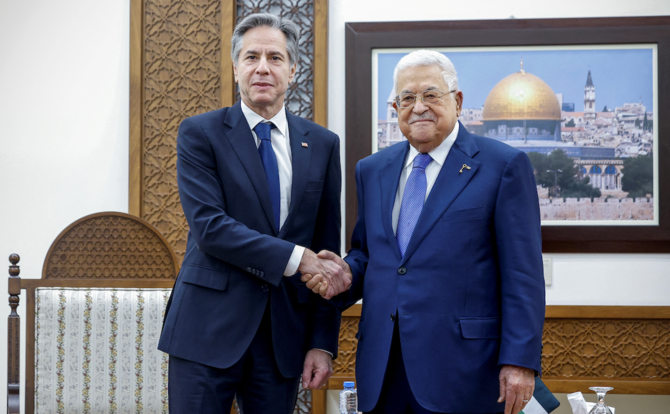
- Palestinian president Mahmud Abbas spoke with Blinken of the need “to stop the Israeli aggression against Palestinian people” in Gaza and the occupied West Bank
Brief CV’s of Kuwait’s newly-formed government

KUWAIT CITY: Brief CVs of Kuwait's newly formed cabinet were announced on Sunday.
The Prime Minister Sheikh Dr. Mohammad Sabah Al-Salem Al-Sabah:
Born in 1955, he holds a PhD in economics from Harvard University and has previously served as Kuwait’s ambassador to the US in 1993, in addition to tenures as foreign minister (2001, 2003, 2006, 2007, 2008, 2009 and 2011), as well as deputy prime minister and acting oil minister.
Fahad Youssef Saud Al-Sabah – Deputy Prime Minister and Acting Interior and Defense Minister:
Born in 1959, he graduated from the Kuwaiti military academy and previously served as an Amiri Guard officer.
Dr. Emad Mohammad Abdulaziz Al-Ateeqi – Deputy Prime Minister and Oil Minister:
Holds a PhD in chemical engineering from Leahy Pennsylvania College and has previously served in numerous academic roles in Kuwait University, including research department chief.
Abdurrahman Badah Al-Mutairi – Minister of Information and Culture:
He holds a BA degree in Psychology from Kuwait University. He served as a Minister of Information and Minister of State for Youth Affairs in the cabinets of December 2020, March 2021, and April 2023.
Dr. Ahmad Abdulwahab Al-Awadhi – Minister of Health:
He holds PhD in Pediatrics (Kuwait Board) from the Kuwait Institute for Medical Specialization, a PhD in Medicine (MD) from the Arab Gulf University in the Kingdom of Bahrain, and BA in basic sciences from the same university. He served as a Minister of Health in the Cabinets formed on October 16, 2022 and April 9, 2023.
Sheikh Feras Saud Al-Sabah – Minister of Social Affairs, Family and Childhood Affairs, Acting Minister of State for Cabinet Affairs:
He served as Assistant Undersecretary of the Ministry of State for National Assembly Affairs.
Dr. Anwar Ali Abdullah Al-Mudhaf – Finance Minister and Minister of State for Economic and Investment Affairs:
He holds a PhD in business management from Claremont College and has been the chairman of Kuwait’s Al-Ahli United Bank since 2014.
Dr. Salem Falah Mubarak Al-Hajraf – Minister of Electricity and Water and Minister of Renewable Energy and Minister of State for Housing Affairs:
He hold a PhD in mechanical engineering from the UK’s Cranfield University and has completed more than 30 researches across scientific fields.
Dawood Sulaiman Marafi- Minister of State for the National Assembly Affairs, Minister of State for Youth Affairs and Minister of State for Communications:
He holds a Master’s degree in business management and served in various roles in the banking sector and the global stock market.
Dr. Adel Mohammad Abdullah Al-Adwani – Minister of Education and Minister of Higher Education and Scientific Research:
He previously served as a professor in Kuwait University’s Faculty of Administrative Sciences.
Abdullah Hamad Abdullah Al-Jouaan – Minister of Commerce and Industry:
He also serves as the chief of Kuwait’s National Fund for the Development of Small and Medium Enterprises.
Abdullah Ali Abdullah Al-Yahya – Minister of Foreign Affairs:
Born in 1966, he holds a Bachelor’s degree in business management from Western Oregon University in the US. Previously served as Kuwait’s ambassador to several Latin American countries, including Argentina, Uruguay, and Paraguay.
Faisal Saeed Nafil Al-Ghareeb – Minister of Justice and Minister of Awqaf and Islamic Affairs:
Born in 1958, he holds a bachelor’s degree in law and Islamic Sharia from Kuwait University. He has been the national carrier Kuwait Airways’ deputy chief since 2020.
Dr. Nora Mohammad Khaled Al-Mashan – Minister of Public Works and Minister of State for Municipality Affairs:
She previously served as an Associate Professor in the Department of Civil Engineering at the College of Engineering and Petroleum at Kuwait University.
Frankly Speaking: Where will Gazans go after Rafah’s invasion?

- Arab League general secretary says Israel wishes to see Palestinians disappear from occupied territories
- Israel has killed at least 35,000 Palestinians, including women and children, in Gaza since October 7 last year
DUBAI: If Arab countries really cared about Gaza, they would throw open their borders to Palestinian refugees. That is a claim made repeatedly by Israel since the Hamas-led attack of Oct. 7 last year sparked the conflict in the Gaza Strip.
According to Ambassador Hossam Zaki, assistant secretary-general to the Arab League, this argument is deeply flawed — ignoring the fact that Arab nations already host millions of Palestinian refugees.
Furthermore, Zaki believes this argument ignores the stark reality that once the people of Gaza are displaced, the Israeli government is unlikely to permit their return — opting instead to seize the land for the state of Israel.
“If we really want the truth, the Israeli wish is to see that the Palestinian population would disappear from the Occupied Territories,” Zaki told Katie Jensen, host of the Arab News current affairs program “Frankly Speaking.”
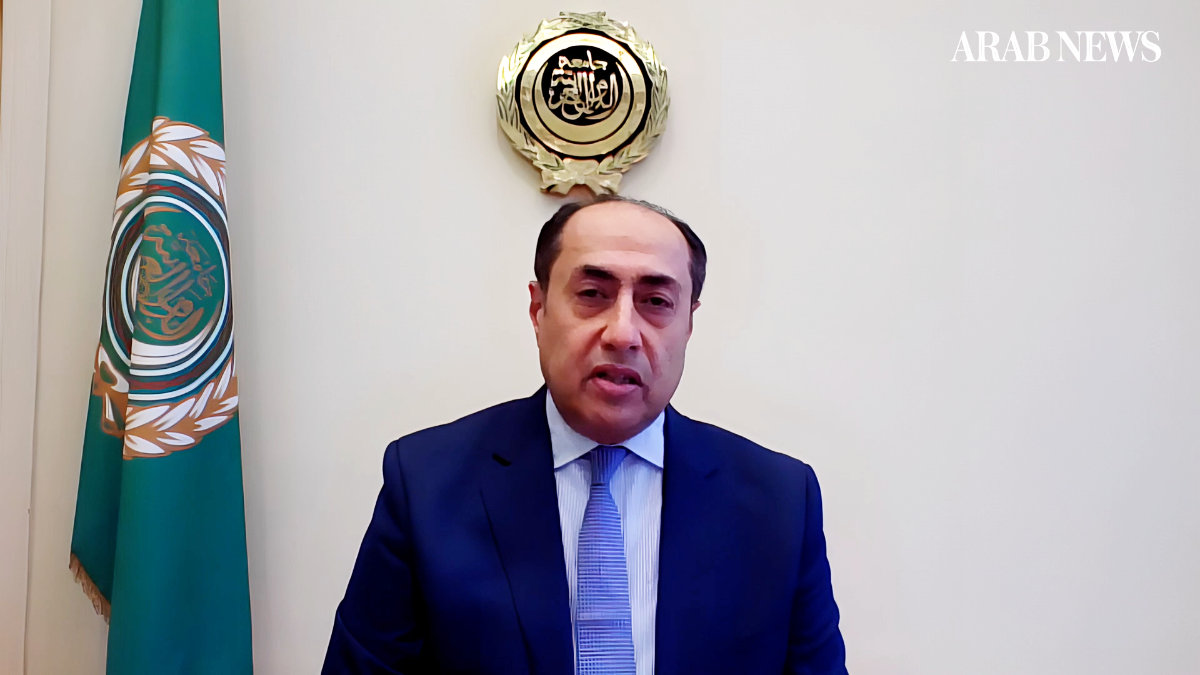
He added: “From the West Bank, East Jerusalem and Gaza, they would love for the Palestinians just to vanish. We all know that, because we know that they want the land. They want to grab the territory. They want to annex the territory to their state.”
In a wide-ranging interview, in which he discussed the forthcoming Arab League summit in Bahrain on May 16, efforts to halt Israel’s assault on Rafah, and the diminishing prospects for a two-state solution, Zaki said previous mass displacements would not be repeated.
“The Palestinians have learned from the mistakes of the past — from the 1948 war and 1967 war — that once they move out of their territory, the territory is confiscated by Israel, taken under control by Israel. And it seems to be such an uphill battle to get it back,” he said.
“The hope of getting back territory is ever so pale. So, what we are doing is, we are assisting the Palestinians to hold on to their territory, to hold on to their land, and not to move out of the land, because they know the consequences of moving out.”
Zaki was equally vehement in his rejection of the Israeli suggestion that the Arab states had failed to offer sanctuary to Palestinian refugees.
“They (the Israelis) can criticize us all they want,” he said. “We have Palestinians living in all Arab countries, some in refugee camps — very, very few — but most living like the normal citizens of these countries.
“In Egypt and in the Gulf countries, in Jordan, in North Africa, all Arab countries, you have Palestinians living.
“Normally, that is a criticism that we are willing to take, because we know that whatever is said in this regard means only to evacuate the territory for the benefit of the Israelis who want to grab it.”
Since the war in Gaza began seven months ago, the Arab League has been actively involved in trying to secure a ceasefire between Israel and Hamas, to arrange for sufficient aid to enter the enclave, and to keep the goal of Palestinian statehood on the agenda.
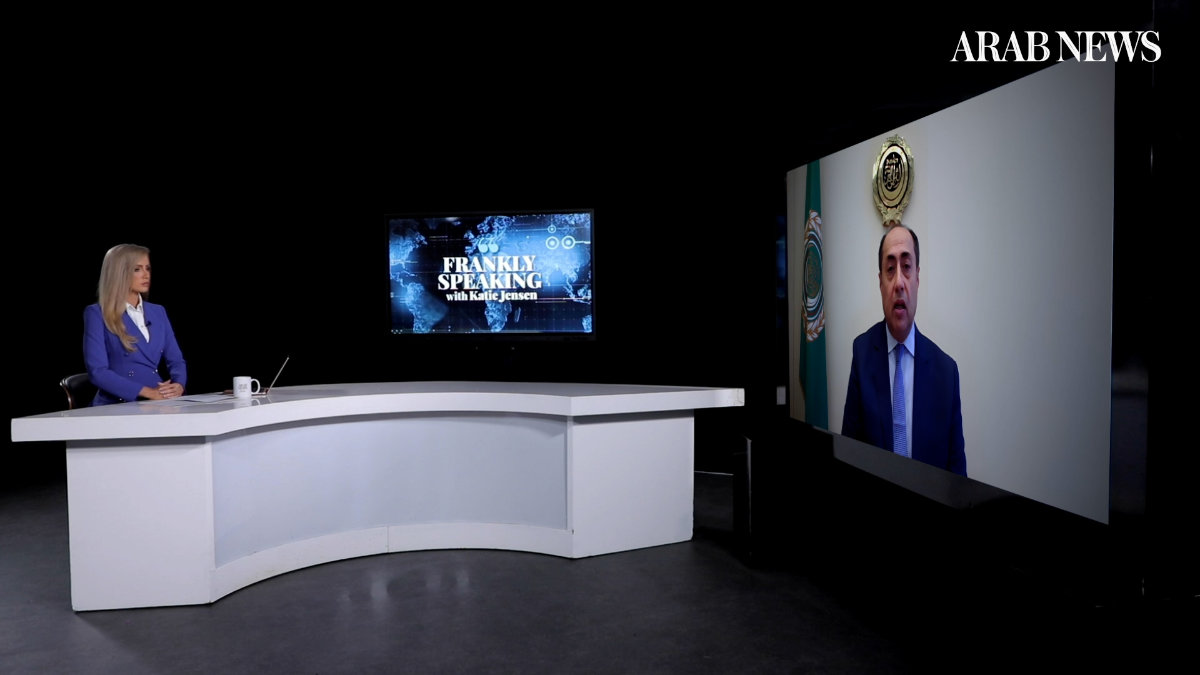
Zaki said the Arab League and its “heavyweight members” — including Egypt, Saudi Arabia, Qatar, the UAE, and Jordan — had continued to promote the Arab Peace Initiative, first unveiled 20 years ago, and were working to stop the “killing madness” continuing.
“But nothing has been successful so far,” he said. “Even the only resolution that the UN Security Council was able to adopt in order to stop the war, to cease the fire, was not implemented. It’s been adopted since, what, one month now? Nothing. As if there is nothing.”
Zaki believes Israel has been allowed to act with impunity owing to the protection and largesse of the US.
“Israel is basically a country that is pampered by the US, pampered by many of its allies, accomplices, so-called friends in the West,” he said.
“They condone what it is doing and they cannot stop it. They cannot stop this madness. Unfortunately, they gave it a carte blanche since the beginning and this is where we are.
“Seven months in this war — this criminal war — and nothing is happening. They are not capable of reigning in this country, this government of extremists.”
Asked whether the Arab League itself shares part of the blame for failing to bring an end to the conflict, Zaki laid responsibility entirely on Washington.
“Why would we — how could we — blame the Arab League?” he said. “The Arab League is not an accomplice in this. The Arab League is not giving bombs to Israel. The Arab League is not giving ammunition to Israel. The Arab League is not funding the Israeli aggression.
“The Arab League is a regional organization, a respectable regional organization, that is seeking peace, that is talking politics. It’s a diplomatic organization. We are willing to engage with whomever is seeking peace as well on the other side.
“Why do we say the US and the West? Because it is the US that’s funding Israel. It keeps transferring money to Israel, aid to Israel, munitions, bombs, weapons, whatever — you name it.”
Israel’s months-long bombardment and strangulation of aid flows has devastated Gaza’s infrastructure. Zaki believes Israel has deliberately sought to make Gaza inhospitable to compel the Palestinian population to abandon their land and accept refugee status abroad.
“The Israelis, in the nasty, very nasty, war against the Palestinians in Gaza, what they’re trying to do is not only to kill Palestinians … they did something which is much more nasty, actually: They have destroyed the infrastructure of the Gaza Strip,” he said.
“They’ve destroyed the health infrastructure, the education infrastructure, the water infrastructure, the electricity infrastructure. This is mean and malignant, and they want to make it a point for the Palestinians who remain in the Gaza Strip — most of the inhabitants — to find this place uninhabitable.
“When the war ends, all the Palestinians would look around and see that this has become totally uninhabitable, so they would want to leave. But surprise to them, I would tell you from now — and mark my words — that is not going to happen.
“They’re going to reconstruct their state, their country. They’re going to reconstruct Gaza, and the Arabs are going to help them. You bet on that. And the international community has enough decent people, enough peace-loving people, who believe in Palestinian rights and who will help them rebuild their country after all the crimes that Israel has committed there.”
Furthermore, Israel has threatened to take over the Philadelphi Corridor — a narrow strip of land along the Gaza-Egypt border, established under the Philadelphi Accord in 2005 and which authorized Egypt to deploy 750 border guards to police its side of the border.
If Israel were to seize control of the Philadelphi Corridor, it could undermine the 1979 Egypt-Israel peace treaty, in which Israel agreed to withdraw from the Sinai in exchange for peace with Egypt and created the current border that bisects Rafah.
“They are playing with fire, and I think they know that,” said Zaki, himself an Egyptian diplomat.
“Those who are taking decisions on the Israeli side are taking a big risk. I do not think that, in their right mind, they would want to see an undermining of the main pillar of peace in the region, which is the Egyptian-Israeli peace treaty of 1979.”
Preparations are underway for the 33rd Arab League summit, during which the leaders of the 22 member states will discuss common challenges facing the region.
With multiple conflicts blighting the Middle East and North Africa, Zaki said there would be “a hefty agenda” this year. “Obviously the issue of the war on Gaza is going to be left, right and center in all of this,” he said.
“Sudan is a big issue for us. The war on Sudan has not receded. It’s been going on for more than a year. It’s unfortunate. We need to address that. The situation in Libya. The situation with Yemen is still a problem. Syria is still an issue for us.
“And, we have a set of other socioeconomic resolutions that are prepared for the leaders to adopt in their meetings. So we do have quite a hefty agenda for our summit this year.”
High on that agenda will no doubt be the prospects of reviving the two-state solution for the Israeli-Palestinian conflict.
“There is no alternative to that solution,” said Zaki. “The Palestinians should have their own state. They should have their own independent contiguous state. Nothing should stand in their way and nothing, really, should justify assisting Israel in diluting this solution.”
But, given the destruction in Gaza, the ongoing spread of settlements in the West Bank, and the deep hostility felt on both sides, some might argue the region is moving further away from the two-state solution.
“No, we’re not moving further away,” said Zaki. “I think the world — which has pretty much paid lip service to this two-state solution for a couple of decades now — is now realizing that, well, lip service is not useful anymore, and we should really engage in active steps, like many European leaders have been saying, active steps.
“Even US Secretary of State Antony Blinken said that several months ago. We should all engage in active steps to make true the Palestinian state — to make it come about and to make it a reality.
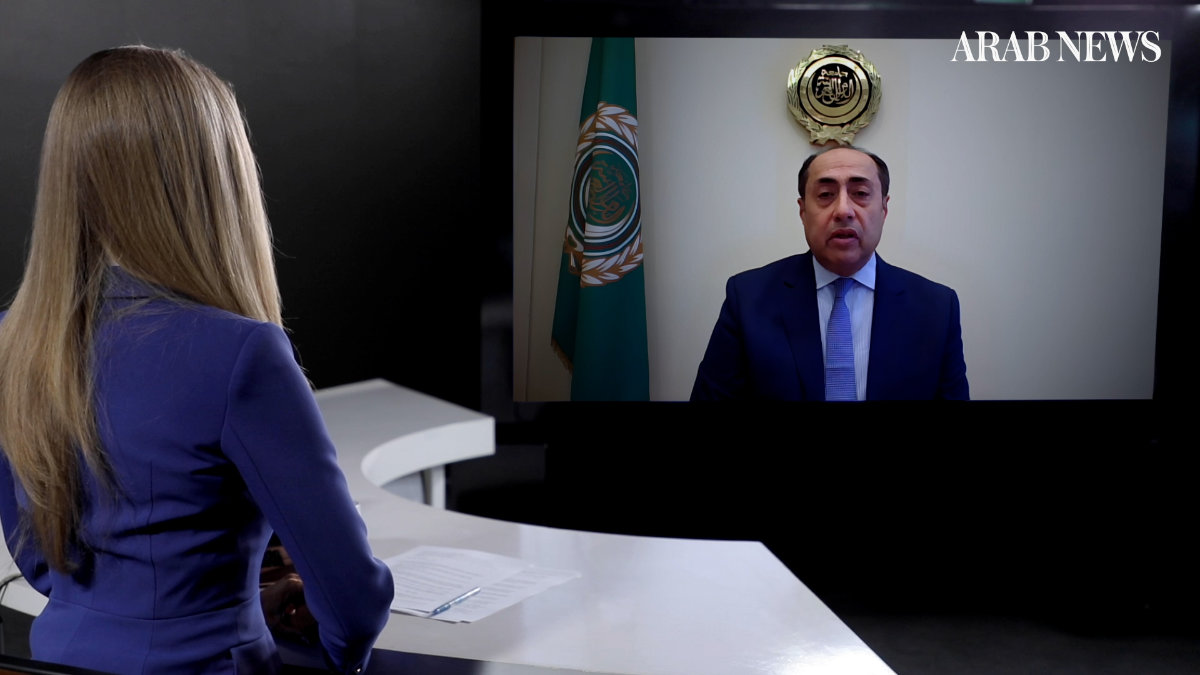
“This is going to happen in the UN; one step closer, one step closer to Palestinian statehood. And things are going to move in this direction.
“The Israelis will have to resist that as they want to, and as they refuse to engage in peace talks, and they refuse to agree on Palestinian statehood. But it’s not up to them.
“We are trying to convince the rest of the world, especially the Western world, that Palestinian statehood should not be subject to an Israeli veto. Because if we do give the Israelis the veto over this, I think they will never agree on it. And a Palestinian state will never see the light of day.”

Israel offensive on Rafah would not eliminate Hamas: Blinken

- Blinken said Hamas militants had already returned to certain areas of northern Gaza that Israel had “liberated”
- Israeli bombardment in the eastern parts of Rafah have already sent 300,000 Gazans fleeing
WASHINGTON: An all-out Israeli offensive on the Gaza city of Rafah would provoke “anarchy” without eliminating Hamas, US Secretary of State Antony Blinken said Sunday, as Washington stepped up a pressure campaign against such an assault.
Separately, US National Security Adviser Jake Sullivan emphasized Washington’s concerns about an offensive in a call with his Israeli counterpart, Tzachi Hanegbi.
“Mr. Sullivan reiterated President Biden’s longstanding concerns over the potential for a major military ground operation into Rafah, where over one million people have taken shelter,” a White House readout of the phone call said.
It said Hanegbi “confirmed that Israel is taking US concerns into account,” but did not elaborate.
Israeli bombardment in the eastern parts of Rafah have already sent 300,000 Gazans fleeing.
The United States and other countries, as well as top UN officials, have warned that a full-out assault on Rafah could have a disastrous impact on the refugees driven there by fighting elsewhere in Gaza, many of them living in desperate conditions.
Israel has said it is attempting to keep civilian casualties to a minimum.
But Blinken, when asked on CBS’s “Face the Nation” whether the US concurred with Prime Minister Benjamin Netanyahu’s statement that Israeli forces had killed more civilians than Hamas militants since the war began, replied simply, “Yes, we do.”

Blinken said a full-scale invasion could come “potentially at an incredibly high cost” and that even a massive assault on Rafah was unlikely to end the Hamas threat.
“Israel’s on the trajectory, potentially, to inherit an insurgency with many armed Hamas left, or if it leaves, a vacuum filled by chaos, filled by anarchy and probably refilled by Hamas,” he said.
Blinken also confirmed that the hold President Joe Biden has placed on weapons to Israel — as the US continues pressing it to better protect civilians and avoid an all-out invasion of Rafah — is limited to 3,500 “high-capacity” bombs.
He said the United States was continuing to press Israeli leaders to provide a plan for Gaza once the war is finally over, telling NBC’s “Meet the Press” that “we’ve been talking to them about a much better way of getting an enduring result.”
The US diplomat said Hamas militants had already returned to certain areas of northern Gaza that Israel had “liberated.”

Blinken also spoke Sunday with Israeli Defense Minister Yoav Gallant, insisting again the United States opposed a major Israel ground operation in Rafah, the State Department said.
“The Secretary underscored the urgent need to protect civilians and aid workers in Gaza and urged the Minister to ensure assistance can move into Gaza and help address distribution challenges inside of Gaza as Israel pursues Hamas targets,” State Department spokesman Matthew Miller said in a statement.
Israel struck Gaza on Sunday and troops battled militants in several areas of the Hamas-run territory, where the health ministry said the death toll in the war had exceeded 35,000 people.

More than seven months into the war, UN chief Antonio Guterres urged “an immediate humanitarian ceasefire, the unconditional release of all hostages and an immediate surge in humanitarian aid.”
Asked about a State Department report issued Friday that said Israel likely has violated norms of international law in its use of US weapons, Blinken said there was still too little evidence to warrant ending all military support.
The chaotic and dangerous conditions of an ongoing war, he said, made it “very difficult” to determine exactly what was happening, or what weapons were used, in any specific action.
Republicans have been sharply critical even of Biden’s limited halt to providing bombs.
Senator Tom Cotton, who serves on the Armed Services Committee, told CBS that the State Department report “was very clear: there is no evidence that Israel is violating international law.”
He said Israel “is doing more than any military in history to prevent civilian casualties.”
Powerful Iraqi Shi’ite cleric Sadr girds for political comeback

- A dominant figure in Iraq since the 2003 U.S.-led invasion, self-styled nationalist Sadr has railed against the influence of both Iran and the United States in Iraq
NAJAF, Iraq: Powerful Iraqi Shi'ite Muslim cleric Moqtada al-Sadr is laying the groundwork for a political comeback two years after a failed and ultimately deadly high-stakes move to form a government without his Shi'ite rivals, multiple sources said.
His return, likely planned for the 2025 parliamentary election, could threaten the growing clout of rivals including Iraqi Shi'ite parties and armed factions close to Iran, and undermine Iraq's recent relative stability, observers say.
However, many among Iraqi's majority Shi'ite population are likely to welcome Sadr's re-emergence, especially his masses of mostly pious and poor followers who view him as a champion of the downtrodden.
Reuters spoke to more than 20 people for this story, including Shi'ite politicians in Sadr's movement and in rival factions, clerics and politicians in the Shi'ite holy city of Najaf, and government officials and analysts. Most spoke on condition of anonymity to discuss sensitive matters.
"This time, the Sadrist movement has stronger plans than the last time round to win more seats in order to form a majority government," a former Sadrist lawmaker said, though the final decision to run has not officially been made.
Sadr won the 2021 parliamentary election but ordered his lawmakers to resign, then announced a "final withdrawal" from politics the next year after rival Shi'ite parties thwarted his attempt to form a majority government solely with Kurdish and Sunni Muslim parties.
A dominant figure in Iraq since the 2003 U.S.-led invasion, self-styled nationalist Sadr has railed against the influence of both Iran and the United States in Iraq.
Iran views Sadr's participation in politics as important to maintaining Iraq's Shi'ite-dominated political system in the long term, though Tehran rejects his aspirations to be recognised as its single most dominant force.
The United States, which fought Sadr's forces after he declared a holy war against them in 2004, sees him as a threat to Iraq's fragile stability, but also views him as a needed counter to Iranian influence.
Many Iraqis say they have lost out no matter who is in power while elites siphon off the country's oil wealth.
CLERICAL NOD
Since March, Sadr has stepped back towards the limelight.
First, he held a rare meeting with Grand Ayatollah Ali al-Sistani, a prominent cleric revered by millions of Shi'ites who played a central role in ending the deadly intra-Shi'ite clashes in 2022 that preceded Sadr's political exit.
Sadrists interpret the March 18 audience with Sistani, who stays above the fray of Iraq's fractious politics and does not typically meet politicians, as a tacit endorsement, according to six people in Sadr's movement.
A cleric close to Sistani said Sadr spoke about a possible return to political life and parliament and "left this important meeting with a positive outcome". Sistani's office did not respond to a request for comment.
Days after the meeting, Sadr instructed his lawmakers who resigned in 2021 to gather and re-engage with the movement's political base.
He then renamed his organisation the Shi'ite National Movement, a swipe at rival Shi'ite factions he deems unpatriotic and beholden to Iran as well as a bid to further mobilise his base along sectarian lines, a person close to Sadr said.
While some analysts fear the disruption of a Sadr return to frontline politics, others say he could re-emerge humbled by the routing of his forces during the intra-Shi'ite strife as well as the relative success of the current Baghdad government, including its balancing of relations between Iran and the U.S.
"Of course, there is always a greater risk of instability when you have more groups balancing power, especially when they are armed. But the Sadrists should return less hostile," said Hamzeh Hadad, an Iraqi analyst and visiting fellow at the European Council on Foreign Relations.
"The political parties know it's best to share power than to lose it all together," he said.
A senior Sadrist politician said the movement might seek to ally with some ruling Shi'ite factions, such as popular Prime Minister Mohammed Shia al-Sudani, while isolating others including arch-rival Qais Al-Khazaali, leader of the powerful, Iran-backed political and military group Asaib Ahl al-Haq.
Advisers to Sudani said he was keeping his options open.
"There are groups in the framework that we have long-time relations with and could ally with before or after elections. What we don't accept is to get into deals with corrupt militias," the senior Sadrist said.
In Sadr City, Sadr's sprawling, long-impoverished stronghold on the east side of Baghdad, many supporters await his return in the hope this could translate into jobs and services.
"This city supports Sadr and I don't think he would forget us after all the sacrifices we have made for him," said Taleb Muhawi, a 37-year-old father of three who was waiting to hear back on a government job.
"He needs to shake things up when he comes back."
Tunisia reports increase in migrant interceptions

- The National Guard also said it had prevented 21,462 people from entering Tunisia across its borders with Algeria in the west and Libya in the east, four times the 5,256 number from last year
TUNIS: Tunisia on Sunday reported a 22.5 percent rise in the number of migrants “intercepted on shore or rescued at sea” as they attempted to cross the Mediterranean to Italy.
The National Guard reported that more than 21,000 people had been prevented from leaving Tunisian shores or had been rescued during the first four months of 2024.
A press statement from the National Guard, which also overseas Coast Guard operations, said 21,545 people were intercepted between January 1 and April 30, compared with 17,576 over the same period last year.
It said the interceptions occurred in an equivalent number of operations — 751 this year and 756 in 2023.
Tunisia and neighboring Libya have become key departure points for migrants, often from sub-Saharan African countries, who risk perilous Mediterranean sea journeys in the hopes of a better life in Europe.
Since January 1, the bodies of 291 shipwreck victims have been recovered compared with 572 last year in almost triple the number of operations (1,967 this year against 686 in 2023), the statement said.
The National Guard also said it had prevented 21,462 people from entering Tunisia across its borders with Algeria in the west and Libya in the east, four times the 5,256 number from last year.
The number of alleged smugglers and their accomplices detained more than doubled, with 529 arrests and 261 prosecutions, up from 203 and 121 respectively last year.
Sfax, the North African country’s second city, remained the main point of departure for clandestine attempts to reach the Italian island of Lampedusa less than 150 kilometers (90 miles) away.
The National Guard said 19,457 would-be migrants were prevented from making the perilous journey in the first four months of 2024, as opposed to 15,468 last year.
Last year many thousands of people from sub-Saharan countries fleeing poverty and conflict, notably in Sudan, and thousands of Tunisians seeking to escape the country’s economic and political crisis attempted to make the crossing.
At Italian instigation, the European Union signed an agreement last summer to provide 255 million euros in financial aid to debt-ridden Tunisia in return for a commitment to curb migrant departures.
According to Romdhane Ben Amor, spokesman for the Tunisian Forum for Social and Economic Rights NGO, the state’s approach to the problem “is not one of rescue but of interception.”
A recent report by the UN’s International Organization for Migration said that over the past decade more than 27,000 migrants have died trying to make the crossing, over 3,000 of them in the past year alone.



